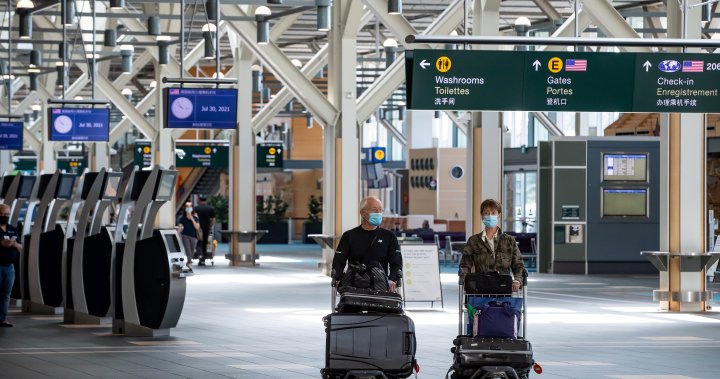A B.C. man has a warning for anyone travelling to the U.S. after an unexpected COVID-19 test result landed him and three friends in self-isolation instead of their intended destination of Las Vegas.
Trevor Meyer said he won’t forget the moment a worker from the CVM Medical test clinic called his name at Vancouver International Airport on Sept. 18, before she put on her surgical jacket and kept her distance.
“She’s like, ‘Were you planning on travelling today?’” Meyer recalled.
“And I’m like, ‘Well, I was, but it looks like I’m not going to be travelling today.’ And she’s like, ‘Yeah, you tested positive.’”

Meyer, who is double-vaccinated and had been experiencing no symptoms, was told to self-isolate and call 811 while his positive rapid-test result was reported to Fraser Health for contact tracing.
After his partner picked him up from the airport, they went to get tested to ensure she did not have COVID-19.
Hours later, both of their test results came back negative.
Because of the conflicting results, Meyer said he got a third test, which also came back negative on Sept. 21, prompting him to question the accuracy of the initial rapid test.
“I was obviously shocked that it came out as a false positive. It’s like, how reliable are these tests?”
Read more:
Understanding false positive and false negative COVID-19 tests
CVM Medical uses the Health Canada-approved BD Veritor rapid antigen test.
The company said it regularly subjects each BD Veritor machine to quality-assurance testing with an independent lab.
Meyer’s test was run on two separate machines and came back positive each time, according to CVM president Graham Williamson. He said 26,000 rapid tests were conducted at YVR in September, ending with 30 positive results.
CVM said it’s up to the health authority to determine whether the positive rapid-test results are true positives or false.
When asked, Fraser Health did not provide that information to Global News.
Williamson said staff offered Meyer a PCR test, but that he declined. However, Meyer said he wasn’t offered another test of any kind after the initial positive result.

He said his three friends also decided not to travel to Las Vegas as a precaution.
“We were trying to do the right thing by going home and not taking the risk of going on a plane with potentially having symptoms,” friend Will Campbell told Global News.
The trio all received negative rapid-test results, but still spent two weeks in isolation.
“We had to quarantine at my house and I have a one-bedroom condo. We were terrified to go home to our families and kids,” Campbell added, saying health officials only followed up on Meyer.
In its emailed statement, Fraser Health said it is not involved with private COVID-19 testing, but will follow up with people who receive a positive PCR test result.
“When a person receives a negative COVID-19 PCR test result, they are not considered a positive case. Therefore, there would be no contact tracing indicated in their case,” the statement said.
Read more:
COVID-19 rapid antigen tests: Everything you need to know
Meyer and his friends were using frequent flyer miles and were able to get credit for their unused flights.
The group ended up only being out of pocket about $600 for four $129 rapid antigen tests and to cancel their U.S. hotel accommodation.
Experts recommend purchasing adequate travel insurance and reading the fine print.
“They need to make sure that they have made bookings that are flexible and have terms and conditions for this type of situation,” Claire Newell, president of Travel Best Bets, told Global News.
“Because one never knows what can happen when tests are required pre-flight.”
Since Jan. 26, all travellers heading from Canada into the U.S. need proof of a negative COVID-19 test 72 hours before boarding.
Meyer’s advice is to get tested at least a day or two in advance to avoid any turbulence at the airport.
View link »
© 2021 Global News, a division of Corus Entertainment Inc.














































